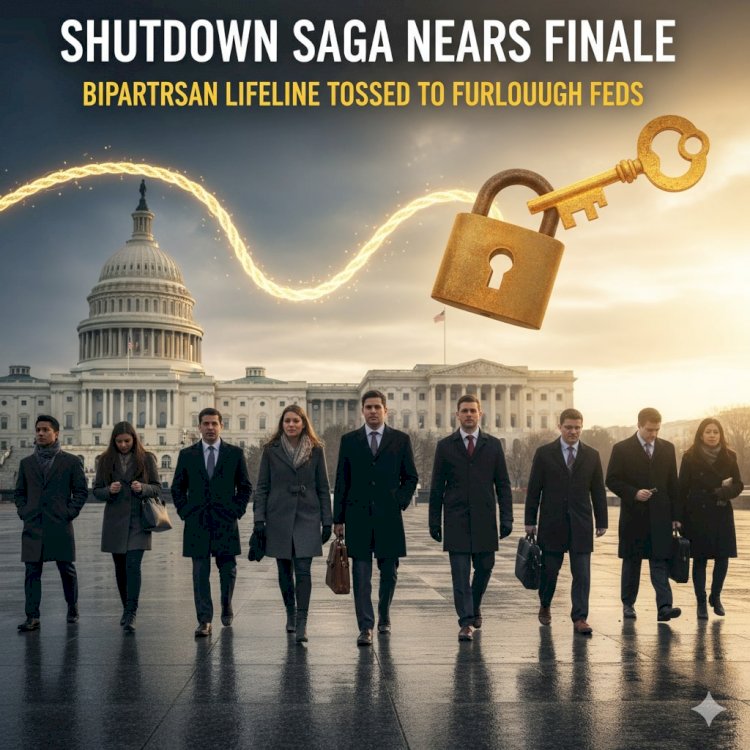Shutdown Saga Nears Finale: Bipartisan Lifeline Tossed to Furloughed Feds

Washington, D.C. – November 11, 2025 – In a plot twist worthy of a Capitol Hill thriller, the U.S. Senate has greenlit a funding bill poised to slam the brakes on the nation's grimmest government shutdown yet. After 41 nail-biting days of closed doors and empty paychecks, lawmakers are inching toward a hard-won truce, with the House now holding the keys to unlocking federal operations before the weekend hits.
Senate's Surprise Slam Dunk: 60-40 Vote Seals the Deal
Picture this: a chamber usually crackling with partisan fireworks suddenly unites in a rare display of harmony. Yesterday's 60-40 roll call saw nearly every Republican lock arms with eight gutsy Democrats, overriding last-ditch pleas to lace the bill with extra strings. The measure, a streamlined stopgap to pump cash back into the federal bloodstream, zipped through the upper house like a well-oiled filibuster dodge. Senate Majority Leader Chuck Schumer hailed it as "a victory for common sense over chaos," while Minority Leader Mitch McConnell quipped, "Better late than legislatively locked out."
This bipartisan ballet comes after weeks of backroom wrangling, where demands for border security bucks clashed with pleas for clean funding. The result? A bare-bones extension that sidesteps the fireworks, at least for now.
41 Days of Fiscal Frostbite: How America's Longest Lockout Unfolded
What started as a routine funding feud in late September ballooned into the mother of all shutdowns, eclipsing the 35-day record set back in 2018-19. Furloughs hit over 800,000 federal workers like a gut punch, from park rangers shooed from Yellowstone's gates to IRS auditors sidelined mid-audit. National parks turned into ghost towns, passport lines froze solid, and even Smithsonian museums draped "Closed for Drama" signs.
At the heart of the standoff? A perfect storm of election-year posturing, with Republicans digging in on immigration enforcement funding and Democrats countering with cries for equity in disaster aid. As paychecks evaporated and IOUs piled up, the public pulse quickened—polls showed approval for Congress dipping into single digits, faster than a viral meme.
House Hurdle: Can Speaker's Gavel Bring the Grand Reopening?
All eyes now swivel to the House of Representatives, where Speaker Mike Johnson faces a high-stakes speed run. With the Senate's baton passed, a vote could land as early as today, potentially flipping the "Closed" signs to "Welcome Back" by Friday. Insiders whisper of whipped votes and whispered deals, but whispers of rebellion from hardline holdouts could drag the drama into overtime.
If it clears, President Biden's desk awaits a swift signature, unleashing a torrent of back pay and reactivated services. Fail, and we're staring down overtime for Uncle Sam's sabbatical.
Frontline Fiascos: Tales from the Shutdown Trenches
Beyond the Beltway bubble, the human toll tells a tale of quiet desperation. Coast Guard families in Alaska scraped by on food pantries after hazard pay halted, while Smithsonian curators fretted over priceless artifacts gathering dust in the dark. One Virginia air traffic controller, speaking on condition of anonymity, shared, "It's like your life's work vanishes overnight—poof, unpaid and unappreciated."
Small businesses near federal hubs felt the ripple too: D.C. tour guides idled, concession stands starved, and contractors clawed for bridge loans. Yet amid the gloom, glimmers of grit shone through—communities rallied with free meals for feds, and volunteer vets stepped up to walk shelter dogs when USDA staff sat sidelined.
Economic Echoes: Billions in the Balance, But Rebound on the Horizon
The shutdown's shadow loomed large over the ledger, with economists pegging daily losses at $1.4 billion in foregone activity. Stock tickers twitched, consumer confidence cratered, and holiday hiring hit the brakes. But here's the silver lining: history whispers of swift snapbacks. Once the spigots reopen, back pay floods in, and the GDP glitch gets glued back together—often within weeks.
Experts eye this as a stark reminder of governance's fragile gears, urging a post-shutdown push for budget blueprints that don't buckle under brinkmanship. As one fiscal watchdog noted, "We've dodged the bullet, but the chamber's still loaded."
In the end—or what's shaping up to be the end—this shutdown standoff spotlights Washington's wiring: a system that teeters on trust, tested by time. With the clock ticking toward resolution, Americans can exhale, if only just a little. The grand reopening? It's not a done deal, but it's damn close.

 content-team
content-team 


















